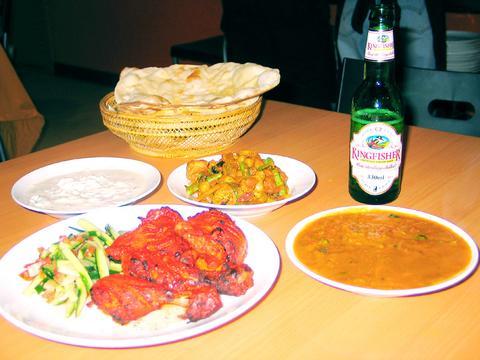Born and raised in India, Daniel Hsiung (熊懌騰) originally came to Taiwan to study Chinese cooking. After finishing cooking school and a few stints in various pub kitchens, Hsiung abandoned Chinese cuisine in favor of his native fare and opened The Spice Shop.
A fourth-generation Indo-Chinese, Hsiung is not the only member of his family to find success in the Indian restaurant business. In fact this is the sixth Spice Shop to open in Taiwan, as two cousins own and operate a total of five restaurants in Kaoshiung, Taichung and Hsinchu.

PHOTO: DIANA FREUNDL, TAIPEI TIMES:
Offering a large selection of vegetarian and non-vegetarian dishes, The Spice Shop serves up curry favorites such as beef madras (beef in coconut sauce), chicken tikka masala, mutton bhuna (mutton with onion and pepper) and others priced under NT$300 each. The most popular and highly recommended dish is the chicken tandoori (NT$300), served with a small side of kuchember (spicy Indian salad).
The vegetarian selection is equally plentiful and tasty. Made with seasonal vegetables the jhalfraizie (NT$180) is a refreshing change from the frozen veggies often used in mixed curry. Channa masala (chickpea curry), palak paneer (made with spinach and homemade cheese) and the daal all come highly recommended at NT$180.
Diners looking to satisfy a sweet craving after their curry will have to settle on a lassi, as there are no desserts on the menu. The mango lassi, made with fresh mango and yogurt, however, should not be overlooked.
The restaurant's decor remains debatable with a limited (yet eye-catching) selection of Indian tapestries hanging on exceptionally bright orange walls, with spindly chip board tables and plastic chairs.
A trained chef, Hsiung says he still prefers to be in the kitchen and still does most of the cooking. Apart from using less oil and chili, which can be increased on request, Hsiung claims he doesn't cater to Chinese or Western tastes, and instead prepares the food exactly as he would in India.
In less than two years since opening, The Spice Shop has acquired a substantial number of regulars who fill the tiny establishment nightly. With a maximum seating capacity of 40 persons, the restaurant fills up early, so reservations are not a bad idea, especially on the weekends.
Even at full capacity the wait for food is not intolerable and rather enjoyable with a selection of beers that includes India's own, King Fisher. Alternatively, patrons can bring their own bottle of wine, but are required to pay a NT$200 corkage charge.

Oct. 21 to Oct. 27 Sanbanqiao Cemetery (三板橋) was once reserved for prominent Japanese residents of Taipei, including former governor-general Motojiro Akashi, who died in Japan in 1919 but requested to be buried in Taiwan. Akashi may have reconsidered his decision if he had known that by the 1980s, his grave had been overrun by the city’s largest illegal settlement, which contained more than 1,000 households and a bustling market with around 170 stalls. Fans of Taiwan New Cinema would recognize the slum, as it was featured in several of director Wan Jen’s (萬仁) films about Taipei’s disadvantaged, including The Sandwich

“Wish You Luck is not just a culinary experience, it’s a continuation of our cultural tradition,” says James Vuong (王豪豐), owner of the Daan District (大安) Hong Kong diner. On every corner of Kowloon, diners pack shoulder-to-shoulder over strong brews of Hong-Kong-style milk tea, chowing down on French Toast and Cantonese noodles. Hong Kong’s ubiquitous diner-style teahouses, known as chachaanteng (茶餐廳), have been a cultural staple of the city since the 1950s. “They play an essential role in the daily lives of Hongkongers,” says Vuong. Wish You Luck (祝您行運) offers that same vibrant melting pot of culture and cuisine. In

Much noise has been made lately on X (Twitter), where posters both famed and not have contended that Taiwan is stupid for eliminating nuclear power, which, the comments imply, is necessary to provide the nation with power in the event of a blockade. This widely circulated claim, typically made by nuclear power proponents, is rank nonsense. In 2021, Ian Easton, an expert on Taiwan’s defenses and the plans of the People’s Liberation Army (PLA) to break them, discussed the targeting of nuclear power plants in wartime (“Ian Easton On Taiwan: Are Taiwan’s nuclear plants safe from Beijing?”, April 12, 2021). The

Artificial intelligence could help reduce some of the most contentious culture war divisions through a mediation process, researchers say. Experts say a system that can create group statements that reflect majority and minority views is able to help people find common ground. Chris Summerfield, a co-author of the research from the University of Oxford, who worked at Google DeepMind at the time the study was conducted, said the AI tool could have multiple purposes. “What I would like to see it used for is to give political leaders ... a better sense of what people ... really think,” he said, noting surveys gave